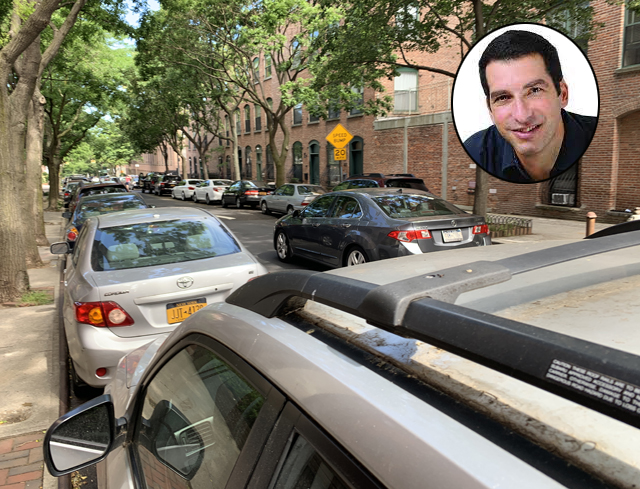On the eve of the final two congestion pricing public meetings — a session for suburbanites on Tuesday at 6 p.m. and a final session on Wednesday at 6 p.m. for residents of Manhattan above 60th Street – we asked Open Plans Chairman Mark Gorton to explain the deeper societal cost of driving and to point the way forward for how the livable streets community can properly message the harm that drivers do to our city. This op-ed is adapted from Gorton's stump speech.
The recent congestion pricing hearings have highlighted the poor state of understanding of the true harms of driving. Many drivers pilot their massive steel boxes through the city in a bubble of entitlement, blissfully unaware of the wave of danger generated by their driving and the significant social harms they impose on the neighborhoods through which they pass.
If wider society is ever to see how damaging auto orientation is to cities, the livable streets movement needs to better articulate how our city is brutalized and degraded by traffic, cars, driving, and parking.
Few people have fought the scourge of driving longer and harder than Charles Komanoff, who is quoted in a recent Streetsblog article as saying, "Everyone who drives has a rationalization to be excused from the toll … but none of them can make an argument that their trip by car doesn’t delay others.” His argument makes it seem as if the problem with driving is that cars don't go fast enough. Of course, Komanoff's point is valid, but congestion is hardly the main harm. His articulation somehow implies that congestion pricing should be implemented as a favor to drivers.
Air pollution and greenhouse gas emissions are what most people think of as the main problems of driving, but these are second- and third-order effects. The main issue is that cars brutalize the human living environment in the city. And our elected officials must stop normalizing driving (and, indeed, stop boasting when they seek to increase the amount of driving by getting more parking for their constituents).
If the city Department of Transportation did not see its main mission as moving cars through our neighborhoods, we could have livable streets with a rich social life. Kids could play, neighbors could meet. Our streets would be safe, welcoming places with a rich social life. Instead, the city streets are deadly places, and drivers force us to stay inside to be safe. We don't know our neighbors. Kids have little chance to meet other kids who live only a few buildings away. Cars steal the space in which people could congregate.
With livable streets, the daily life of everyone in the city would be transformed. I want to live in this transformed city where I am connected to my neighbors, but I can't because cars and drivers degrade my street.
The major harms of driving are invisible. No one can see the neighbors who don't gather, the friendships not formed, the seniors stuck inside instead of sitting at city-provided cafe tables and chairs, the kids who aren't biking to school. Most people have never seen a world like this [it exists — check out the video below] and don't even realize it is possible. Drivers are certainly not thinking about the hundreds of kids that they intimidate, isolate and endanger.
One person quoted in the recent Streetsblog article pointed out that cars force us to live in a world of "hostility and aggression, noise and air pollution, and the constant physical and psychological threat of violence." While this phrasing is an improvement over what most other people are saying, it still doesn't connect the dots in a way that will get clueless drivers to understand. Drivers threaten our communities with constant physical violence, brutalize our streets, and destroy the social life of our city. Driving keeps people from living the lives that they would like to be able to live.
These harms are not new. In the 1970s, Berkeley Professor Donald Appleyard analyzed how traffic degrades the social life of neighborhoods. This Streetfilm does a nice job presenting his work:
Drivers impose their will on everyone who lives on every street. They steal the freedom of kids to bike and play and neighbors to meet. They ruin the human living environment.
In addition to the actual, real, measurable societal costs that drivers impose on all of us, drivers also need to pay for the wave of danger that propagates from their car. They need to pay for every person they bully, intimidate and scare at each intersection and on every street. They need to pay for the constant stress that they impose on everyone that they pass. They need to pay for forcing vigilance on everyone on the street. They need to pay for all the people that are not on the street because drivers have made our own living environment toxic. They need to pay for all of the friendships not formed due to our degraded social environment. They need to pay for all the people who would like to bike but can't because drivers make it too dangerous. They need to pay for the time stolen from people whose bus is stuck in traffic. They need to pay for all the businesses that could be thriving with a richer street environment.
But before we can expect society to make drivers pay, the livable streets movement needs to clearly and repeatedly explain the social, societal and personal harms of driving and move beyond merely talking about global warming, air pollution, and congestion.
Mark Gorton is the chairman of Open Plans, the livable streets advocacy group, and publisher of Streetsblog.







